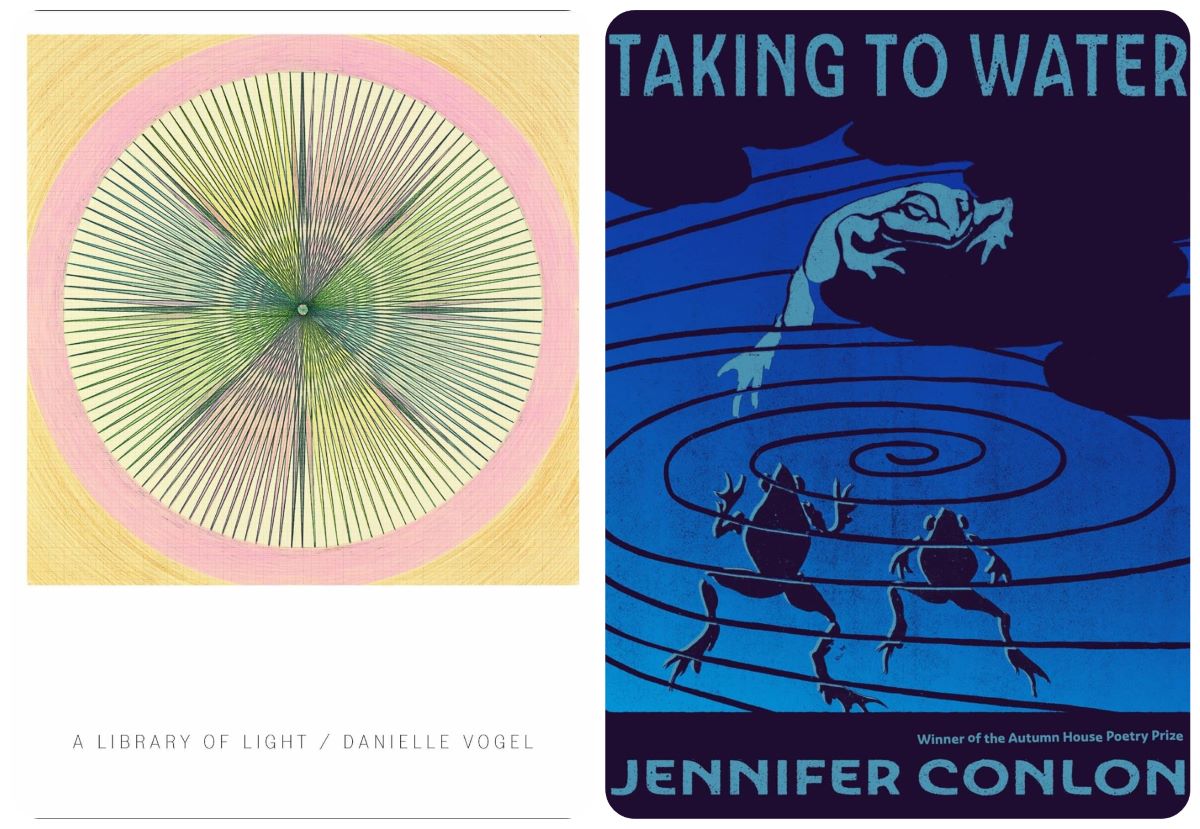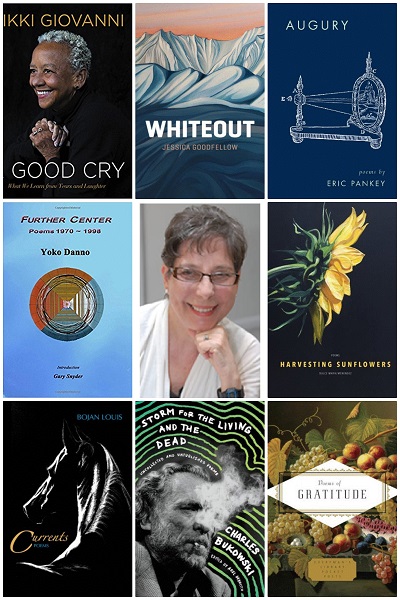New collections to make life more lyrical.

Danielle Vogel’s A Library of Light (Wesleyan University Press) weaves its fragmented, lyric memoir through prose poems that ruminate on biophotonics, epigenetic theory, and the death of the author’s mother. “Within my body and yours, a coherent, ancestral light,” ends a short excerpt on page 16. The book is organized into three sections: “Light,” “Of Light,” and “Light” again.
This recursive naming is indicative of the movement of the book as it activates an incantatory mode to move the syntax forward. At times, this can be challenging, as readers search for a touchpoint to connect with the collection’s emotional resonance. The “Of Light” section seems keenly aware of this affect, as it allows the “I” to enter more fully and the throughline and loose narrative of the mother’s passing to take shape.
Thematically, this collection owes a great debt to Maggie Nelson’s Bluets, which also operates with an intense, contemplative focus on a particular subject, while formally using a segmented, prose-poem style. At times, the similarities are so close as to be almost antiphonal.
“Sometimes, when asked what I’m working on, I tell people I’m writing a translation of light,” writes Vogel in a sentence that could be lifted directly out of Bluets, if one replaced “light” with “blue.” But this simply puts Vogel’s cross-genre work firmly within a large and growing tradition of experimental poetry. Prismatic processing of memory informs the diction. We arrive and depart from moments honest and heartfelt.
“My whole life, up until the moment of her dying, I felt I was practicing my mother’s death,” the poet announces near the midway point of the book, and then echoes that grief later on, stating:
“Transfixed together. Rooted in a delicate, invisible repatterning of light.”
There are surprises here for the attentive reader, and the pace of the book calls for a kind of internal inertia that can be difficult to appreciate in our breakneck, accelerated world. I found myself intrigued by how much white space — and, by extension, light — takes over the third section. At times, readers will encounter a single line, a single sentence on a page.
By introducing such formal variation, Vogel avoids the feeling that all fragmentary or ultra-segmented works can have — that one is reading notes for a book rather than the book itself. But, as the title suggests, this is more than just a collection; it’s a collection of collections. A Library of Light lingers in the imagination and in the heart long after the poems have ceased their chanting.
*****
Jennifer Conlon’s Taking to Water (Autumn House Press), their 2023 debut, is rich with questioning and ritual. The book opens with a description of faux-glossolalia titled “Tongues,” and the theme of learning, unlearning, or performing religious rituals permeates the book’s metaphorical and imagistic lexis. The landscape of North Carolina and of fishing joins with that diction to plant the reader within a coastal Southern context that leaves little room for gender fluidity. As such, the speaker of these poems questions memory, questions gender, and moves attentively through a catalog of trauma with various “Dad Figures” — a term the poet repeats often.
All of this manifests a kind of libation the poet pours over various poetic forms. “How to Measure Pain from a Porch-Step,” a 15-line poem early in the book, is like a sonnet that questions sonnets — not in content, mind you, but in difference. Forms that question form fit thematically with Conlon’s explorations of gender. There are prose poems, contrapuntal, numbered, short lyrics, multiple-choice, and a variety of free-verse poems that seem to arise out of Denise Levertov’s idea of “Organic Form.”
The final poem, “Trans Us the New Gods,” is a good example of this attention to change, flexibility, and fluidity in form. The poem moves in numbered sections, but all of them have the same number, “ii.” Most readers won’t miss the significance in highlighting the number two and its associations with binaries, which the poet is actively questioning.
This choice also suggests a kind of stasis, of inertia, that is the source of the inquiry into all the book wants to engage with. The liminal state made tangible by form, as it were. “I am hiding my fist / all the time I pass / from rage to rage to rage / I pass you on the way,” the poem states in its third section, which also serves a kind of volta leading toward the end of the book. Conlon leaves the reader with a sense of radiance, of “living the questions,” as Rilke suggested in his Letters to a Young Poet.
The line “into the center memory / our sky opens / imagine the spill of us” completes the rituals of the collection, suggesting a new libation to come. There are times when the book is raw with emotional weight and times when it is restrained by pacing. But always, it feels honest, intelligent, and thoughtful. It’s easy to see why Taking to Water won the Autumn House Press Poetry Prize, and why folks will want to read it more than once.
Steven Leyva’s poetry collection is The Understudy’s Handbook.
